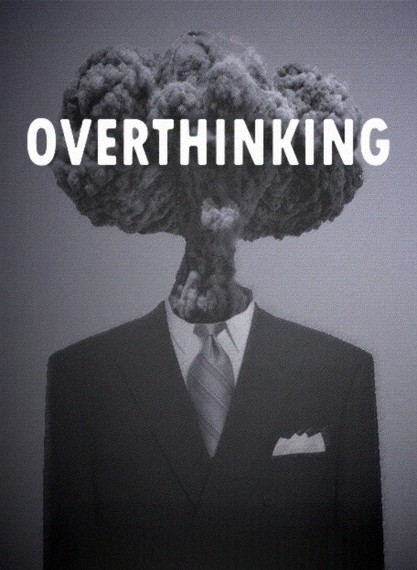I was in India with my cousin Vivek, and I had asked him to take me on a typical bus that he takes to work because I wanted to do what the locals do: take a bus to work. On my insistence, he agreed.
While we were waiting for the bus, I heard him say, "OK. Start running."
I looked over to my right and saw this completely full bus barreling down the dirt road. Passengers were hanging to the sides of the bus using their fingernails and sometimes parts of the arms inside the window.The bus driver had no intention of stopping as there was simply no room. So what people do is run along and somehow wedge themselves into the huge pile on the bus.
There's no way I was getting on that bus, I thought. It was just too full. There had to be a bus that was less full; so I'd wait for the next one.
The second bus came and it too was brimming to the top with people, and I started thinking these negative thoughts: You'll get hurt. It's just too full. Wait for the next one. And so on.
The second bus went by without me on it because I was overthinking what could happen if I tried to catch that insanely crowded bus.
At that point, I was frustrated with myself, and my cousin wanted us to leave and take a taxi instead. I didn't want to give up so easily but was also very afraid of getting hurt. I also thought there would be a bus that was less full.
Finally, the third bus arrived and it was the same scene: lots of people filling the bus with some scrambling to hold on to the windows on the side.
As it approached, my mind started to go into the default mode of overthinking the negative, holding me back from running and trying to get on. At that point, I became angry with myself for not being able to do what others were doing: running and somehow getting on an overcrowded bus.
I wanted to silence the self-doubt in my head and started taking steps forward, which turned into a slight jogging pace.
I found myself running and was able to find a small spot where I jumped and caught a small area to stand wedged between some other people. As soon as I exhaled, I realized that my hold was slipping but felt the hand of another helping me back onto the bus.
Finally, I had caught the bus.
The lesson from this story, told by Bob Miglani in an interview with my friend, Skip Prichard, is a simple one: conditions are never perfect.
If we wait for conditions to be perfect before we take action, we will never take action.
As T. Harv Eker wrote in his bestseller, Secrets of the Millionaire Mind, most people take the approach of "Ready. Aim. Fire." There is, of course, some value to this approach.
Unfortunately, though, most people get stuck on "Aim." They don't want to pull the trigger until the aim is just perfect.
My experience, and that of many highly successful people, is that we should follow T. Harv Eker's advice of changing the order of the operation to "Ready. Fire. Aim."
Of course, I'm not saying that we should blindly make a decision that could have dire consequences.
The idea is that we do our homework and gather enough basic information to make a well-informed decision about something. Once we have enough information to be moderately well informed, we should take action of some type.
Once we take action and create some type of movement toward our goal, that's when we work to refine our aim.
In the story above, Bob was able to find a place to stand only when he started running with the bus. Had he stood still, he wouldn't have seen the place he could stand or, if he did, he would have seen it too late.
It's so much more effective to refine our aim while we're learning from real world conditions than trying to refine our aim based on the hypothetical knowledge we gather before we begin taking action of some type.
Eric Ries makes it so clear in his fantastic book, The Lean Startup, that taking action as soon as possible and refining the aim while learning from experience is absolutely essential for entrepreneurs.
This is also one of the Google's principles for innovation: launch early and iterate often.
And, of course, it's also essential for life in general.
My experience has been that things never end up as bad as I imagine they could in my mind. "Mistakes" are often the greatest gifts.
As Mark Twain is quoted as saying, "Twenty years from now you will be more disappointed by the things that you didn't do than by the ones you did do. So throw off the bowlines. Sail away from the safe harbor. Catch the trade winds in your sails. Explore. Dream. Discover."
________________
Matt Tenney is a social entrepreneur, an international keynote speaker, and the author of Serve to Be Great: Leadership Lessons from a Prison, a Monastery, and a Boardroom.

